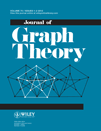
JOURNAL OF GRAPH THEORY
Scope & Guideline
Elevating Research Standards in Geometry and Topology
Introduction
Aims and Scopes
- Graph Structures and Properties:
Research often addresses various types of graphs, including planar graphs, bipartite graphs, and Hamiltonian graphs, exploring their inherent properties and behaviors. - Graph Algorithms:
The journal frequently publishes papers on algorithms related to graph theory, including coloring, matching, and connectivity algorithms, contributing to the computational aspects of graph studies. - Combinatorial Properties and Extremal Graph Theory:
There is a significant focus on combinatorial aspects, including Ramsey theory, Turan problems, and extremal graph theory, which study the conditions under which certain configurations must exist. - Applications of Graph Theory:
The journal also covers applications of graph theory in areas such as network theory, optimization, and combinatorial design, demonstrating the practical relevance of theoretical findings. - Graph Representations and Transformations:
Research often delves into various representations of graphs, including digraphs and hypergraphs, as well as transformations like graph products and embeddings.
Trending and Emerging
- Random Graphs and Probabilistic Methods:
Recent publications show a marked increase in studies utilizing random graph theory and probabilistic methods, reflecting a growing interest in the behavior of graphs under random conditions. - Structural Graph Theory:
There is a notable trend towards exploring the structural aspects of graphs, including connectivity, expansion properties, and topological features, indicating a shift towards understanding the underlying frameworks of graph theory. - Algorithmic Graph Theory:
The rise of algorithmic approaches, particularly in the context of computational efficiency and complexity, is increasingly evident, with researchers focusing on developing faster algorithms for various graph problems. - Interdisciplinary Applications:
The journal is seeing a surge in papers that apply graph theory to interdisciplinary fields such as biology, computer science, and social networks, highlighting the versatility and applicability of graph theoretical concepts. - Graph Dynamics and Evolution:
Emerging themes include the study of dynamic graphs and their evolution over time, reflecting an interest in understanding how graphs change and adapt in various contexts.
Declining or Waning
- Graph Coloring Techniques:
While graph coloring remains a significant topic, recent publications indicate a gradual decline in the exploration of traditional coloring techniques, with newer methodologies gaining traction. - Classical Extremal Graph Theory:
Although still relevant, the classical approaches to extremal graph theory are appearing less frequently, as researchers shift towards more generalized or applied frameworks. - Geometric Graph Theory:
Despite having a foundational role in the field, studies specifically centered on geometric graphs and their properties have seen reduced publication frequency, possibly in favor of more abstract and combinatorial approaches.
Similar Journals

Algebra And Discrete Mathematics
Exploring the Depths of Algebra and Discrete MathematicsAlgebra And Discrete Mathematics, published by LUHANSK TARAS SHEVCHENKO NATIONAL UNIVERSITY, is a pivotal academic journal dedicated to exploring the realms of algebra and discrete mathematics. Since its inception in 2012, this journal has contributed significantly to the mathematical community, catering to researchers, professionals, and students interested in advancing their understanding of both classical and contemporary mathematical theories. With categories placed in Q4 in Algebra and Number Theory and Q3 in Discrete Mathematics and Combinatorics, and rankings that place it among various domains with percentiles reflecting its niche status, the journal offers a platform for innovative and high-quality research. While the journal is currently not open access, it maintains a robust academic presence, and its continuous publication until 2024 ensures a steady stream of scholarly discourse. Researchers and academics keen on disseminating their findings or keeping abreast of the latest developments in these mathematical fields will find valuable insights and diverse methodologies within its pages.
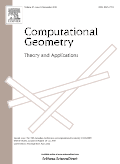
COMPUTATIONAL GEOMETRY-THEORY AND APPLICATIONS
Exploring Innovative Solutions in Computational MathematicsCOMPUTATIONAL GEOMETRY - THEORY AND APPLICATIONS is a premier academic journal published by Elsevier, specializing in the interdisciplinary field of computational geometry. Since its inception in 1991, this journal has had a significant influence on the advancement of computational mathematics, offering a platform for innovative research that explores the theoretical and applied aspects of geometry and its applications in various scientific domains. With a 2023 impact factor placing it in the Q2 category for Computational Mathematics and Geometry and Topology, researchers can trust the rigor and relevance of the work published here. While the journal does not currently offer an open-access option, it remains highly influential, ranked in the mid-range percentile across multiple categories including Computational Theory and Mathematics and Control and Optimization. Therefore, it serves as an invaluable resource for researchers, professionals, and students passionate about pushing the boundaries of knowledge in computational geometry and its myriad applications. The ongoing publication commitments extend until 2025, further solidifying its role in shaping the future of this dynamic field.
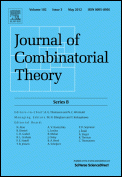
JOURNAL OF COMBINATORIAL THEORY SERIES B
Fostering Collaboration in Combinatorial TheoryJOURNAL OF COMBINATORIAL THEORY SERIES B, published by Academic Press Inc., Elsevier Science, is an esteemed journal within the discipline of combinatorial theory, discrete mathematics, and theoretical computer science. With a rich history since its inception in 1971 and ongoing publication through 2025, this journal has established itself as a pillar in its field, currently holding Q1 category rankings in multiple areas including Computational Theory and Mathematics, Discrete Mathematics and Combinatorics, and Theoretical Computer Science. The journal features cutting-edge research and developments, attracting contributions from both established professionals and emerging scholars. Despite the absence of an open access option, the journal's strong impact reflected in its Scopus ranks—such as being number 16 out of 92 in Discrete Mathematics and Combinatorics (83rd percentile)—signifies its influential role in advancing knowledge and innovation. Researchers seeking to share impactful findings and connect with a vibrant academic community will find the JOURNAL OF COMBINATORIAL THEORY SERIES B an essential resource.
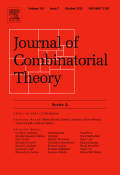
JOURNAL OF COMBINATORIAL THEORY SERIES A
Fostering Breakthroughs in Computational Inquiry.JOURNAL OF COMBINATORIAL THEORY SERIES A, published by Academic Press Inc. Elsevier Science, stands as a pivotal platform for researchers in the realm of combinatorial mathematics and theoretical computer science. With an impact factor that underscores its influence and a well-respected reputation reflected in its rapid ascent to Q1 rankings in discrete mathematics and computational theory, this journal serves as a critical resource for academics seeking to advance their understanding of complex combinatorial structures and algorithms.
Founded in 1971, the journal covers a wide spectrum of topics within combinatorial theory, providing a robust forum for innovative research and theoretical advancements until 2025. Including a strong position in the Scopus rankings—notably, it ranks #10 out of 92 in discrete mathematics—the journal is essential for both emerging scholars and established professionals committed to pushing the boundaries of mathematical and computational inquiry. Researchers are encouraged to submit their findings to this esteemed publication, as it offers a non-open-access model that ensures rigorous peer review and high visibility within the academic community.

Analele Stiintifice ale Universitatii Ovidius Constanta-Seria Matematica
Exploring the Depths of Analysis and Applied MathematicsAnalele Stiintifice ale Universitatii Ovidius Constanta-Seria Matematica is a prominent open-access journal established by OVIDIUS UNIV PRESS in Romania, dedicated to advancing the fields of mathematics, specifically in Analysis and Applied Mathematics. Since its inception, the journal has emphasized the dissemination of high-quality research, making it accessible to a global audience. With an ISSN of 1224-1784 and E-ISSN 1844-0835, it has positioned itself within the academic community, achieving a respectable Q3 ranking in both analysis and applied mathematics in 2023, reflecting its commitment to rigorous scholarship. The journal spans a considerable publication window from 2009 to 2024, catering to the ongoing developments in mathematical sciences and their applications. Researchers, professionals, and students alike will find valuable insights and contributions that enrich their understanding and foster collaboration within the mathematical community. The journal's headquarters is based at the Faculty of Mathematics & Computer Science, Bulevardul Mamaia 124, Constanta, Romania.
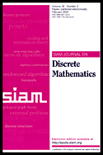
SIAM JOURNAL ON DISCRETE MATHEMATICS
Navigating the landscape of discrete mathematics.SIAM Journal on Discrete Mathematics is a premier academic journal dedicated to the publication of high-quality research in the field of discrete mathematics. Published by SIAM Publications, this journal features original research articles covering a broad range of topics, including combinatorial optimization, graph theory, and algorithm design. With an impressive impact factor placing it in the top quartile (Q1) of mathematics journals, it is a valuable resource for researchers and practitioners looking to stay abreast of the latest advancements in discrete mathematics. Although currently not open access, the journal commits to disseminating rigorous and impactful findings that advance the understanding of mathematical concepts and their applications in various scientific domains. Renowned for its rigorous peer-review process, the SIAM Journal on Discrete Mathematics serves as an essential platform for scholars aiming to contribute to this evolving field, making it a must-read for anyone involved in mathematical research.

Aequationes Mathematicae
Elevating Mathematical Discourse Since 1968.Aequationes Mathematicae is a distinguished academic journal published by SPRINGER BASEL AG, focusing on the dynamic fields of Applied Mathematics, Discrete Mathematics, and Combinatorics. Since its inception in 1968, the journal has served as a vital platform for disseminating high-quality research, with Converged Years expected to extend to 2024. With an impressive Q2 ranking in multiple mathematical disciplines as of 2023, Aequationes Mathematicae is positioned within the top half of its field, reflecting its reputation for excellence. Spanning the globe from its base in Basel, Switzerland, this journal is ideal for researchers, professionals, and students seeking to advance their knowledge and contribute to ongoing discussions within mathematics. While it does not currently offer Open Access options, readers can still access an extensive archive of impactful studies that bolster its standing within the academic community.
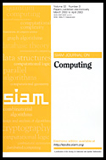
SIAM JOURNAL ON COMPUTING
Shaping Tomorrow’s Innovations in Computer Science and Mathematics.Welcome to the SIAM Journal on Computing, a premier publication of SIAM Publications dedicated to advancing the field of computational science. Established in 1984, this journal provides a platform for groundbreaking research and theoretical advancements that shape the landscape of both Computer Science and Mathematics. With an impressive impact factor and consistently ranking in Q1 quartiles for its categories, the journal remains an essential resource for scholars looking to contribute to innovative computational theories and methodologies. Although not currently an open-access journal, the SIAM Journal on Computing offers rigorous peer-reviewed articles, ensuring high-quality contributions that appeal to researchers, professionals, and students alike. As we converge towards 2024, this journal continues to play a vital role in influencing future research directions and fostering an academic community devoted to the exploration of computational challenges. Join us in exploring the forefront of computing research!

Communications in Combinatorics and Optimization
Advancing the Frontiers of Combinatorial ResearchCommunications in Combinatorics and Optimization is a prestigious open-access journal published by Azerbaijan Shahid Madani University, focused on advancing research in the fields of combinatorial mathematics and optimization. Since its inception in 2016, the journal has established a reputation for disseminating high-quality research, achieving a commendable Q2 ranking in both Control and Optimization and Discrete Mathematics and Combinatorics as of 2023. With a Scopus ranking of #13 in Discrete Mathematics and Combinatorics, it is positioned in the top 14% of its field, underscoring its significance in the academic community. By providing unrestricted access to its articles, the journal promotes the widespread dissemination of knowledge, fostering collaboration and innovation among researchers, professionals, and students around the globe. Based in Iran, the journal continues to contribute to the global discourse on effective combinatorial and optimization techniques that address contemporary challenges.
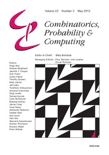
COMBINATORICS PROBABILITY & COMPUTING
Exploring the Intersection of Mathematics and ComputingCOMBINATORICS PROBABILITY & COMPUTING is a premier journal published by Cambridge University Press, focusing on the cutting-edge fields of combinatorics, probability, and their computational aspects. Established in 1992 and set to continue its impactful discourse through 2024, this journal holds a distinguished reputation, reflected in its Q1 ranking in applied mathematics, computational theory, and statistics, showcasing its pivotal role in advancing research in these areas. With an ISSN of 0963-5483 and an E-ISSN of 1469-2163, the journal welcomes high-quality papers that contribute to the theoretical foundations and practical applications of the disciplines. While it is not available as open access, its accessibility through institutional subscriptions ensures wide readership within academia. The journal is a vital resource for researchers, professionals, and students alike, providing a platform for innovative ideas and pioneering research that shapes the future of mathematics and computer science.